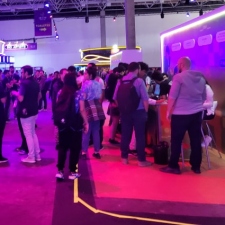While we were at BIG Festival this past week, we had the opportunity to meet all kinds of industry heavyweights and discover the secrets of their success.
At the festival, a panel of industry experts took to the stage to discuss the importance of diversity in game companies, and how addressing the concerns of employees can lead to a more positive working environment.
Diversity is an important topic not just in the games space, but in society at large. Game makers have a big part to play in this development and BIG had plenty of opportunities for big names to highlight the voices of minorities in the game making process.
A panel discussion on the subject saw team members from the likes of Tapps Games, PUGA Studios, Webcore Games, 44 Toons, and APTA discussing their efforts in fostering diversity in the workplace.
“As producers of content we have a responsibility. We have to represent those that weren’t considered in production up until a few years ago,” said 44 Toons' Ale McHaddo. “When we talk about diversity, sometimes people think of charity, but the content of the game benefits from that not because of charity but because we have a diverse audience.”
The world is becoming more and more socially liberal with each progressive generation. Thirty years ago, the current levels of queer representation in the media, let alone the widespread recognition of same-sex marriage, would have been unthinkable. There are more and more people from marginalised groups within the games industry, and more and more in leadership positions - or at least being given the opportunity to affect change.
“This committee is something essential for a company, and for our products. We created our anti-racist manual because it’s not just about diversity of gender. We have to think about everything,” said Tapps Games’ Daniela Costa. “Or company has a freedom of suggestion. Regardless of being a part of the committee you can still bring in ideas and creativity.”
“We felt that we really needed this kind of support,” said Webcore Games producer Camila Malaman. “We wanted to understand how companies work and we created a CO of diversity.”
Malaman also highlighted some lesser known issues within the industry, for example members of marginalised communities being left out of training or other business opportunities, such as gaming events. A diversity committee can help recognise any barriers preventing minority employees from succeeding where their other colleagues do.
Accelerating inclusivity
“It’s very important to be able to share what we do in PUGA,” said PUGA’s Debora Palhares. “Our committee was started by the board in 2021." Palhares discussed an employee who worked with the committee to encourage more focus on neurodivergence in the company’s products, and the structure of the committee and its actions to ensure that everyone in the company was aware of its culture, and knew how to participate to create a positive workforce.
“It’s important to create a space where people are welcome, but it’s also about the benefits that it brings to the company, such as inclusivity and diversity.”
It’s clear that the key to progress is to listen to employees and consumers alike, making note of legitimate criticism and making an effort to improve. Today, many consumers actively seek out products from diverse companies, and as highlighted by McHaddo, a diverse workforce can help attract these audiences by letting companies create products which resonate with people across demographics.
Regardless of who we are, we want to see ourselves authentically represented in the media we consume, and highlighting the voices and offering opportunities for advancement to marginalised employees, or even simply listening to and addressing their concerns, can drastically improve the final product’s chances in an increasingly crowded landscape by speaking to a variety of audiences, or even educating consumers on issues regarding diversity.
We recently highlighted the state of queer representation in the games space.






















